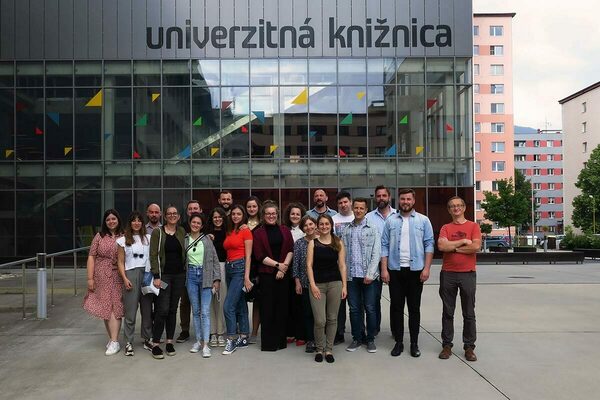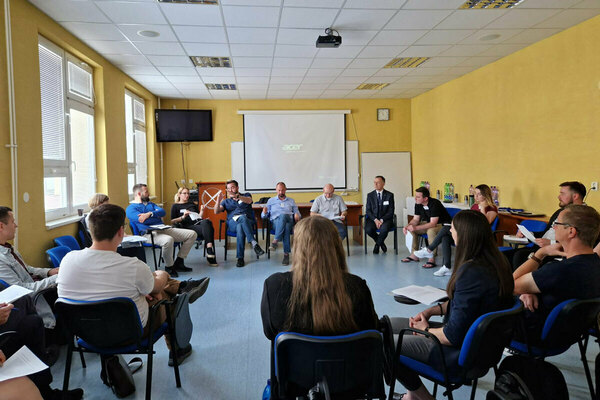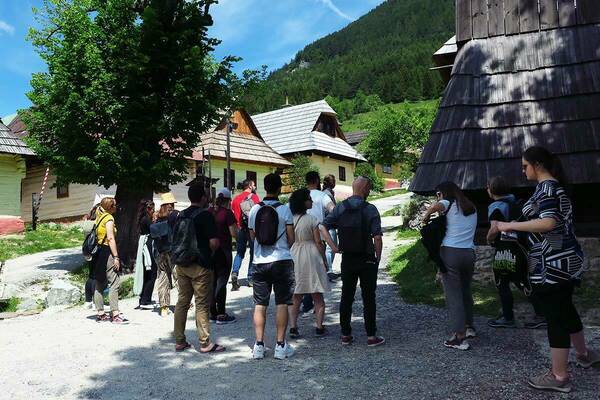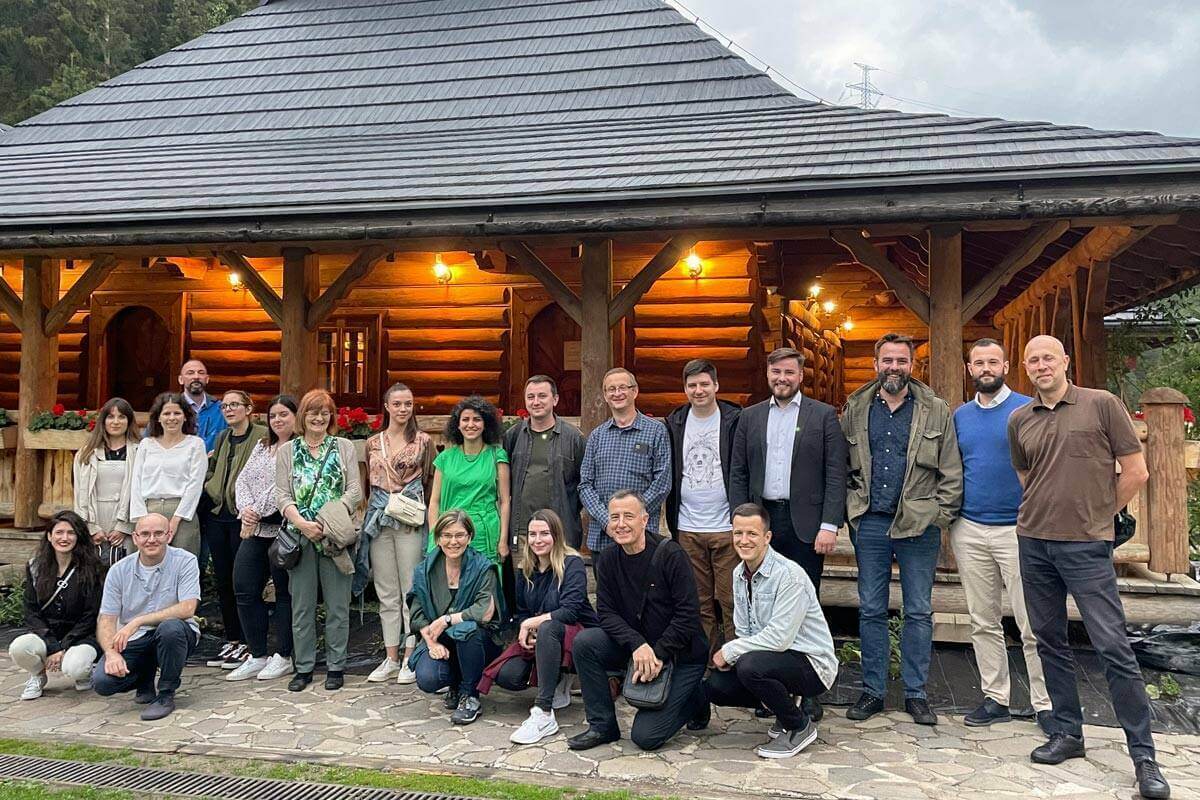
Eugen Zelenak is an associate professor in the Faculty of Arts and Letters at the Catholic University in Ružomberok, Slovakia. He previously served as vice dean for international relations and faculty development in the faculty of philosophy. Zelenak participated in the Nanovic Institute’s Catholic Leadership Program at Notre Dame in 2018 and in the Advanced Leadership Program in Rome in 2022.
Here is a very short summary of how I, together with colleagues from my university, Catholic University in Ružomberok, and from partner institutions of the Catholic Universities Partnership (CUP), an initiative started by the Nanovic Institute, prepared and realized an Erasmus+ activity for our doctoral students: I gathered information about the new Erasmus+ Blended Intensive Program (BIP) from my university’s international office; I briefly considered how to join it; I emailed friends in Zagreb; I emailed a colleague in our international office and further communicated with colleagues in Lublin; we had several Zoom meetings; finally, we enjoyed an extremely busy two weeks of personal encounter, and then … the whole thing was over amid feelings of relief, joy, and enthusiasm for next year’s program.
In many ways, all of us who organize events, seminars, or meetings of various types know the process and could talk at length about the responsibility, the amount of work, the leadership needed, the problems we typically encounter, and also the joy these events bring. But, let me share my experience, starting from the beginning, and reflect upon what I learned about leadership, planning, and how important it is to rely on the help and support of others.
Realizing an Erasmus+ Activity

The BIP is a new opportunity falling under the Erasmus+ framework, EU’s programme to support education, training, youth, and sport in Europe. It is a format best suited for organizing short but intensive seminars, courses, or summer schools. BIP supports a consortium of at least three EU-based institutes of higher education to encourage their students or staff to participate in a program consisting of both a short in-person activity (five or more days of seminars, lectures, or workshops) and a virtual component. BIP programming is at an early stage and our program focusing on doctoral students — “Academic Skills in Publishing and Project Preparation: Experience from Central Europe” — was the first BIP activity realized at our university. That is why organizing this program was a bit of a step into unknown territory. Although the basic guidelines were quite clear, none of our faculty or staff has past experience in BIP preparation to be able to advise and guide us in how to run the program. Everything needed to be designed and executed from scratch.
The core of our partnership consisted of Catholic University in Ružomberok (my home institution), the Catholic University of Croatia, and John Paul II Catholic University of Lublin (KUL). Thanks to both previous Erasmus mobility exchanges and ongoing cooperation within the CUP, I had personal friends from Zagreb with whom I knew I could work. After learning about the BIP framework, I immediately thought this would be a good chance to collaborate with them on something truly useful for our doctoral students. During the pandemic, I also had the opportunity to realize a virtual Erasmus mobility “in” Lublin and had a chance to talk to the director of KUL’s doctoral school. These personal contacts and the fact that all our universities cooperate within the CUP, an initiative started by the Nanovic Institute, helped a lot. It is always great to cooperate with people you know or with whom you are united in a common purpose.
The fact that our institutions have ongoing cooperation within such frameworks as the CUP is invaluable. One clearly realizes this when preparing for this type of event.

We spent several weeks discussing and preparing a program that would take place in Ružomberok. We needed to handle practical aspects (such as how to motivate students to join the program and to be willing to travel to Ružomberok for the in-person part of the program) and, of course, the most important element: program content. This required preparing a demanding and interesting program for students, not just in the form of lectures but, perhaps more importantly, practical activities and an outside-the-classroom activity in which we brought the group for a short hike to the wooden village of Vlkolinec, a UNESCO heritage site. Finally, in the middle of June 2022, the students and their professors arrived in Ružomberok and our BIP began. First, participants attended various in-person lectures and workshops in Ružomberok (June 13-17) and then, after they returned home, the BIP went virtual as students worked on assignments and participated in several online meetings (June 20-23).
Lessons Learned
Reflecting on the event, what lessons have I learned?
First, it is great to cooperate with people one knows from the past. It was immensely helpful to work together with professional contacts who have become friends from Zagreb and Lublin. The fact that our institutions have ongoing cooperation within such frameworks as the CUP is invaluable. One clearly realizes this when preparing for this type of event.
I have also learned that good leadership demands reliance on others. When I was designing the whole program I approached it from the perspective: “try to cover as much as possible by yourself, do not put a burden on others.” Although I asked colleagues from all our partner universities to contribute and they gladly did, I still somehow thought the best thing would be to do as much as possible by myself. I thought that everyone was busy with her or his own duties and that there was no need to add another item to their agenda. I now know that this was a mistake. Of course, there are always some people who are apathetic and not interested in helping with anything except what must be done, but my experience is that most people are enthusiastic and helpful. To put it in more general terms, using the Dutch author Rutger Bregman’s “radical idea” from his book Humankind, “most people, deep down, are pretty decent.” They are willing and most of them even like to help others. One only needs to ask.
This is what I need to remember: good organizers should not try to master superpowers such as being in two places at once. Instead, they should plan to rely on help from others.
Everybody knows that when you are presenting at a conference, it is quite demanding to also have to concentrate on the organizational work. When it came to the BIP event, it was indeed difficult to focus on giving lectures and supervising workshops and, at the same time, taking participants to lunches or sightseeing or dealing with their various queries about housing, transportation, or other practical matters. My BIP organizational team was quite small — and unexpectedly made smaller when COVID-19 intervened yet again — so I had to improvise and ask our doctoral students to help. They did help and they were eager to do so. This is what I need to remember: good organizers should not try to master superpowers such as being in two places at once. Instead, they should plan to rely on help from others.

Finally, it seems to me that it is not as important to strive for perfection as it is to create a welcoming and friendly atmosphere. After the BIP event, we received very positive feedback from participants. From both the feedback we asked them to submit at the end of the event and emails we received after everyone had returned home, it was clear they highly appreciated the fact that people were friendly and that they had a chance to meet other doctoral students. Yes, the smooth running of the program itself was important but in a couple of years, the participants will remember meeting this or that nice person and not the fact that they had to wait five minutes longer than promised to get their lunch.
Human beings are social animals, not merely in the sense that they like the company of others. They also seem to be social in that they need to count on others. I should bear this in mind more often: there are situations when the best thing one can do is rely on those around them.